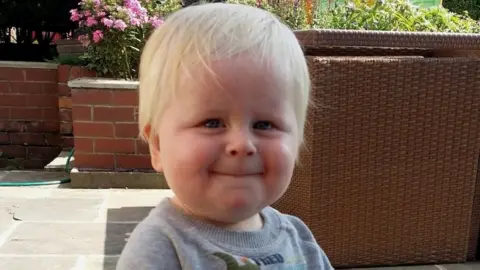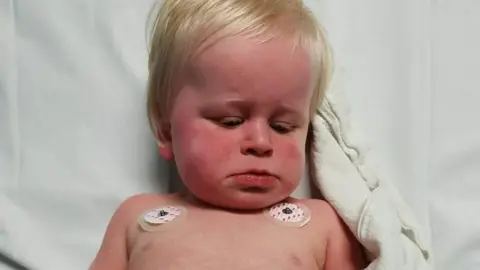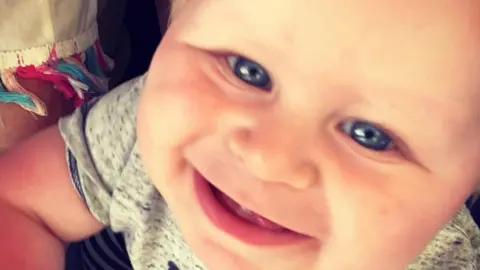Cheshire baby death inquest hears chances to save him were missed
 Family photo
Family photoA toddler from Cheshire died from a bacterial infection because doctors missed opportunities to diagnose and treat him, an inquest has found.
Fifteen-month-old Olly Stopforth, from Frodsham, died two days after being discharged from the Countess of Chester Hospital in March 2020.
He had a streptococcal infection, which led to sepsis and a viral infection.
A jury inquest at Warrington Coroner's Court found medics could have saved him if tests had been carried out.
In a statement read out by the coroner the hospital trust said it had improved since Olly's death and was now using the national guidelines on sepsis testing.
A solicitor for Olly's parents, Laura and Karl Stopforth, said it had been "incredibly painful and difficult" for them to hear from hospital professionals that more should have been done to properly diagnose and treat their son.
They felt their son was "not considered as a priority when he was in hospital" and they had been "very upset to hear that the medical staff trusted with their little boy's care did not provide him with adequate medical attention".
"No parent should lose their young child as they have, it is especially painful because they lost their beautiful boy in preventable circumstances," the solicitor added, saying the family would be pursuing a medical negligence claim against the trust.
 Family photo
Family photoThe inquest jury accepted the Covid-19 pandemic had made things harder for staff during the time when Olly was being treated.
It heard that hospital staff were under pressure because the pandemic had just started and they were unsure about how it would affect children or how long patients should be kept in hospital.
But the jury found the baby was not adequately cared for at the hospital, as doctors thought he only had a viral infection and did not carry out tests that could have shown he was suffering from the more serious bacterial infection.
Olly was taken to the Countess of Chester Hospital after becoming ill at home and a video consultation with a GP who suspected he had a viral infection.
One of the paramedics who took him to hospital thought Olly had "grossly abnormal" signs and was "very poorly", as he had a rash, a high temperature and a high heart rate.
Olly remained at the Accident and Emergency Department for nearly six hours before being transferred to a ward, and was discharged four hours later.
His mum Laura found him dead in bed two days later.
 Family photo
Family photoA consultant paediatrician at the Countess of Chester, Dr Alison Timmis, told the inquest no steps had been taken to rule out a bacterial infection.
She agreed that if Olly had been given antibiotics it was "very likely" he would have survived.
An expert witness told the inquest she did not understand why a sepsis screening tool had not been used at the hospital.
Another expert, microbiologist Prof Vav Cartwright, said in a statement: "Almost any intravenous antibiotic or antibiotic combination likely to have been employed would have been highly active against streptococcus."
"On the balance of probabilities Olly would have required a two-week course of antibiotics, after which he would have made a full recovery," she added.
Coroner Jacqueline Devonish said it was her sincere hope the trust had learnt serious lessons.

Why not follow BBC North West on Facebook, X and Instagram? You can also send story ideas to [email protected]
